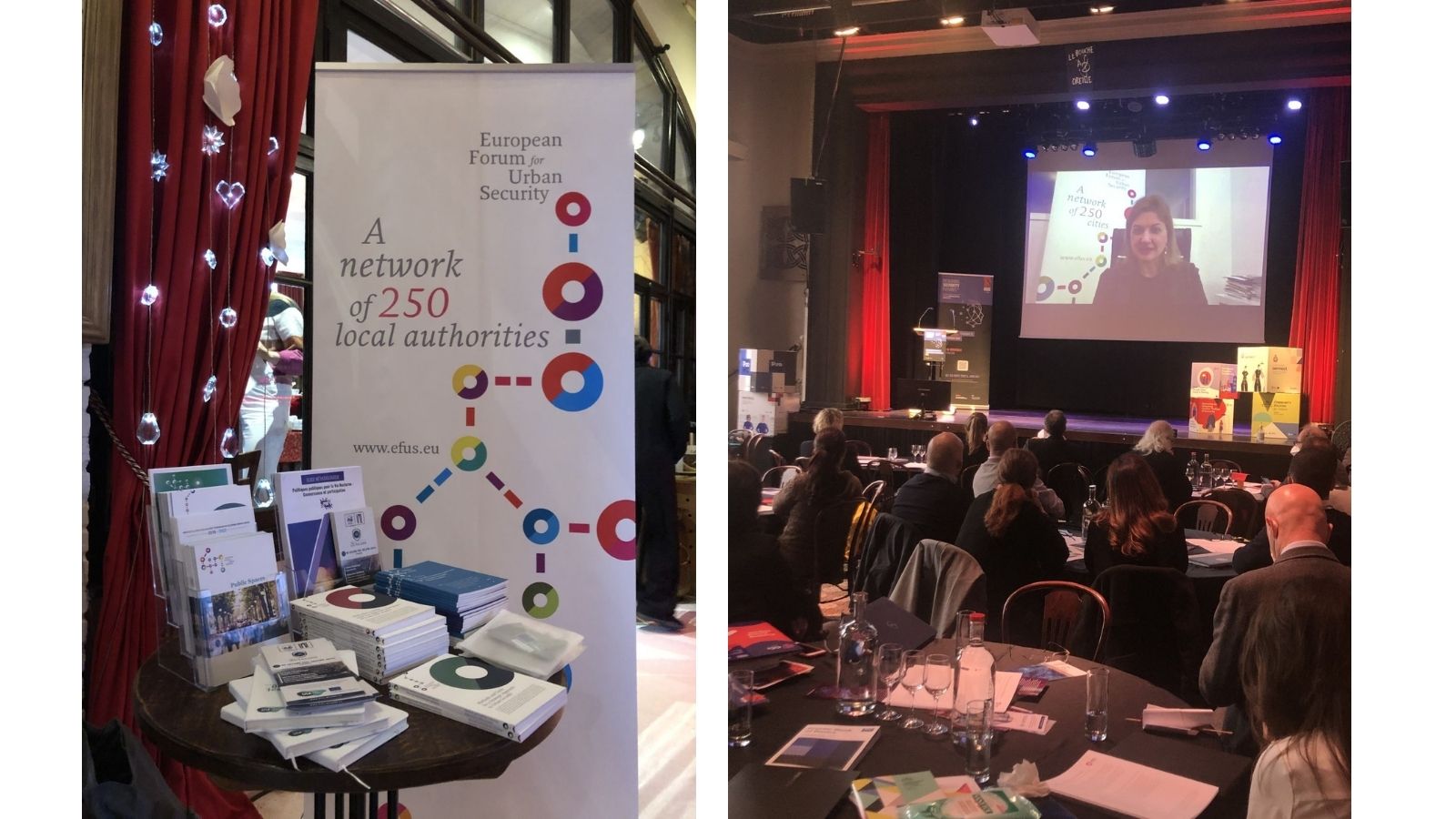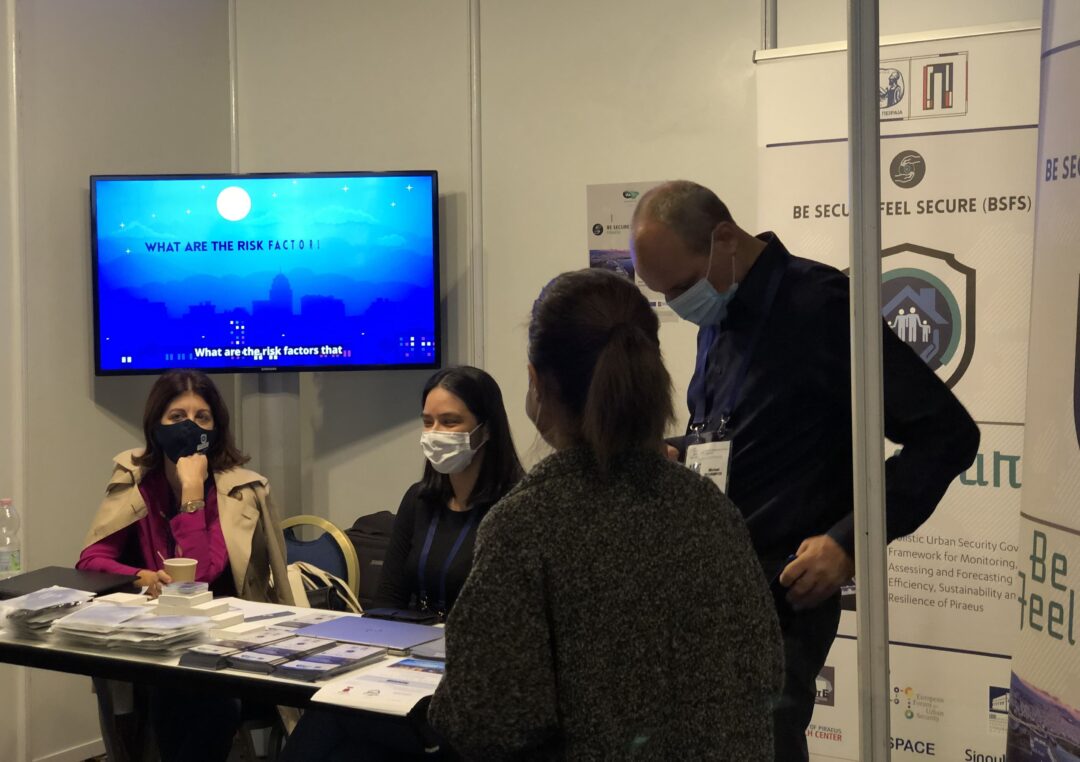Brussels, Belgium, 24-25 November 2021 – The Cutting Crime Impact (CCI) project led by the University of Salford and in which Efus was a partner concluded in November 2021 with a conference focused on “a human-centred innovation process for researching, defining, developing and demonstrating practical solutions to real problems facing police, their partners and citizens.”
Held in a hybrid format, both in person in Brussels and online, the two-day event titled Designing Security Futures gathered academics and representatives from the EU’s Directorate General Home Affairs (DG Home), the United Nations Office on Drugs and Crime (UNODC), European Law Enforcement Agencies (LEAs), other EU research projects, as well as European local and regional security practitioners and Efus.
The three-year Cutting Crime Impact project (2018-2021) was funded by the EU’s Horizon 2020 research programme.
“Extremely satisfied with the results”
Representing the European Commission’s DG Home, which had issued the call for this research project, Andrea de Candido said they were “extremely satisfied not only with the specific, punctual results of the project, but also because it addressed general issues that we consider fundamental in security research.”
The project’s focus on petty crime is particularly interesting for the Commission, he said, “because it is as important as organised crime and terrorism and it affects the daily lives of citizens.” Another highlight of the project is that “it was not only dedicated to the development of technologies. Indeed, its human-centred approach is very relevant to security research.” A third key aspect for the Commission is that CCI involved the end-users (i.e., law enforcement agencies) throughout. “We will be using the project as an example of how this is possible,” said Mr de Candido.
A new European security model
One of the main outcomes of the project as sought by the European Commission when commissioning it is a comprehensive European security model, a general framework that encapsulates the fundamental principles, domains of action and purpose of all future EU security policies.
Andrew Wootton and Caroline Davey, of the University of Salford, explained that their
starting point was the observation that many EU programmes and policies target “big scary issues” such as terrorism, but not so much those that concern the majority of citizens, such as everyday crime and feelings of insecurity. Hence the need for a model that would be citizen-focused and “crime agnostic”, based on the needs of citizens rather than on any specific crime form.
Based on European values such as fundamental rights, democratic control and ethics, the CCI researchers established five principles on which to base any future European security policy and action: citizen-centred, transdisciplinary (valuing holistic approaches), preventative (prioritising prevention over sanction), collaborative, and demonstrable (evidence-based). Actions flow from these principles: for example, understanding citizen behaviour and perspective, which can be done through safety audits as long advocated by Efus, flows from the citizen-centred principle.
“These European values, principles and actions are aimed at supporting practitioners who themselves work for European citizens and make them safer,” explained Andrew Wootton.
Andrew Wootton and Caroline Davey present the European security model at the CCI final conference: five core principles on which all actions are based.
Eight toolkits
The other main outcome of the project is the eight toolkits developed with the partner law enforcement authorities in the four areas covered by CCI, which were predictive policing, community policing, Crime Prevention through Urban Design and Planning (CP-UDP) and measuring and mitigating citizens’ feelings of insecurity. Presentations were made by representatives from the National Police of the Netherlands, Greater Manchester Police (UK), the Estonian Police & Border Guard, the Municipal Police of Lisbon (Portugal), the State Criminal Police of Lower Saxony (Germany) and the ministry of the Interior of the Government of Catalonia (Spain) (more information on these toolkits, including their own dedicated website, is available on the CCI website).
Efus to capitalise on the CCI approach and tools
Concluding the conference, Elizabeth Johnston, Efus Executive Director, stressed that Efus has long worked on citizens’ feelings of insecurity and on the impact of petty crime, and that “cities are instrumental in collecting and assessing such perceptions among citizens.” She said that Efus is now keen to capitalise on the tools developed by CCI and promote them among its 250 member local and regional authorities.
She added that Efus’ current, broad-ranging IcARUS project chimes with CCI in that one of its focus areas is petty crime, but also, more generally, because its “guiding principle is to provide strategic foresight to cities so that they can anticipate upcoming security challenges.”
Ms Johnston stressed that the European security model presented by CCI is in line with Efus’ “human- and citizen-centred approach” and that Efus welcomes and promotes such an “inclusive, sustainable and rights-based approach at the European level.”
> Watch the CCI final conference on YouTube





